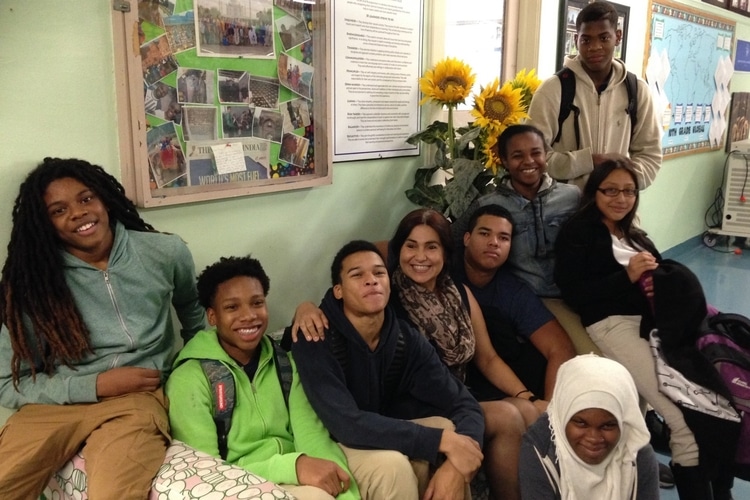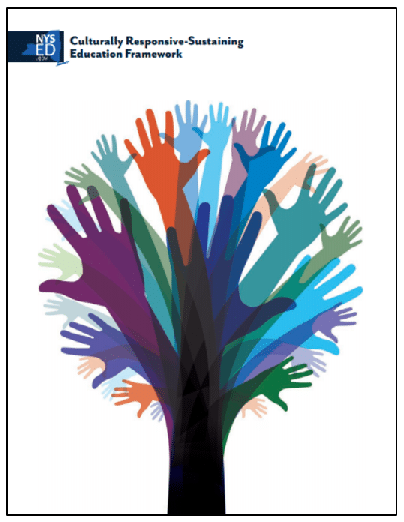Celebrating Learning Can Be Moving and Uplifting, and We Need To Get It Right
CompetencyWorks Blog
 (This blog post began as a comment that Joy Nolan wrote on a recent CompetencyWorks post about recognizing outstanding student achievement in competency-based schools. Thanks, Joy!)
(This blog post began as a comment that Joy Nolan wrote on a recent CompetencyWorks post about recognizing outstanding student achievement in competency-based schools. Thanks, Joy!)
Celebrating learning can be moving and uplifting, and like all other aspects of education, we need to get it right, which may mean unlearning and improving upon ideas and practices that don’t serve our students (meaning: all our students) as well as possible. Chris’s ideas about honoring progress are cool, and so is the practice of sharing out and recognizing excellent project-based learning.
Schools are both places of learning, and issuers of credentials . . . and we need to be thoughtful about all aspects of practice.
One of the newer member schools in NYC’s Mastery Collaborative (www.masterycollaborative.org) recently realized they needed to rethink honor roll and start recognizing students whose mastery has grown most, as well as students who have reached high levels of mastery. Their thinking: Both are amazing and meaningful accomplishments, so let’s celebrate both—especially as this is a more equitable way to roll in a world (our world) that inequitably advantages and disadvantages students in many ways that can show up on transcripts.
 If our vision is genuine educational equity (aside: not everyone shares this vision, and some will agree in word and not in action), we need to be intentional and critically conscious to bring it about. We’re looking at you, beliefs, policies, and practices. We have much actionable, research-based and road-tested knowledge about what works to support learners and to bring about more equitable schools—yet we know we’re a long way off from this vision. Moving toward a more equitable steady state—a world we have yet to see— requires learning, unlearning, and collective action. We have our circles of practice and community, along with the principles of student-centered learning, competency-based education, and culturally responsive-sustaining education to guide us.
If our vision is genuine educational equity (aside: not everyone shares this vision, and some will agree in word and not in action), we need to be intentional and critically conscious to bring it about. We’re looking at you, beliefs, policies, and practices. We have much actionable, research-based and road-tested knowledge about what works to support learners and to bring about more equitable schools—yet we know we’re a long way off from this vision. Moving toward a more equitable steady state—a world we have yet to see— requires learning, unlearning, and collective action. We have our circles of practice and community, along with the principles of student-centered learning, competency-based education, and culturally responsive-sustaining education to guide us.
We know that learning is a cognitive process that is not most helpfully framed as a competition nor as a race. We know that ideally grades are neither rewards nor punishments, but instead messages about where a student is in terms of mastery of key skills and knowledge—at a point in time.
We know that mindsets for learning—growth mindset, and its less famous but powerful cousins, value mindset (“There is value for me in the effort and time I put into academic work”) and belonging mindset (“My school is for me; I am an important part of a community; it matters that I am there”)—are vital dispositions that power the multidimensional set of achievements every student must reach to graduate high school. Do we foster or discourage these mindsets by separating out a small number of students who “really” got there in some way that may have to do with technical aspects of credentialing systems, and a variety of answers to “What’s in that grade?” What aspects of learning are we valuing over others when we post honor rolls and choose valedictorians based on GPA?
We are collectively engaged in deepening mastery-based, culturally responsive, and student-centered learning, so let’s use their equity principles to consider what honor-by-ranking traditions message to all learners in a school, including students who do not and will not see their academic efforts over the years recognized in these ways.
So how should we handle class rank and GPA? Scholarships are often based on these factors. My colleague Meg Stentz suggests that we use these documentations of achievement to the extent that they are keys to students’ accessing scholarships, selective colleges, internships, and other opportunities. That said, maybe we don’t need special tassels and bulletin boards for highest class rank, etc.—unless we are also doing special tassels and bulletin boards for other kinds of significant academic achievement.
It’s beautiful, positive, and energizing to lift up students’ worthy accomplishments. Focusing on practices that turn learning into a competition may clash with our efforts toward equity, student-centered learning, and mastery-based learning—and blind us to other aspects and stages of learning that are worthy of celebration—especially since access and opportunities are far from equally available to all students, the education system is not equally responsive to students of all racial and social identities . . . and these realities dramatically affect GPAs.
Students are energized and lifted up when we recognize their achievements—so by all means, let’s keep doing that, and be thoughtful about how.
Hoping for more ideas about how to honor learning in ways that do justice to the vital mission of a world where every student is able to confidently assume their school is “for” them, and to the principles of mastery-based learning. Great to see this conversation happening in the CompetencyWorks community. Thanks!
Learn More:
- Recognizing Outstanding Student Achievement in Competency-Based Schools
- The Mastery Collaborative: Dozens of NYC Schools Support Each Other’s Reforms
- Diversifying the Student Body and Personalizing Student Schedules at NYC iSchool
- How Competency-Based Learning Supports Culturally Responsive Curriculum
- Amplifying Messages on Equity and Anti-Racism from SXSW EDU
 Joy Nolan is Director of the New York City Department of Education’s Mastery Collaborative program, a community of public schools across the five boroughs that are implementing culturally responsive, mastery/competency-based shifts. Joy also has a background and abiding interest in student-centered learning and curriculum design.
Joy Nolan is Director of the New York City Department of Education’s Mastery Collaborative program, a community of public schools across the five boroughs that are implementing culturally responsive, mastery/competency-based shifts. Joy also has a background and abiding interest in student-centered learning and curriculum design.